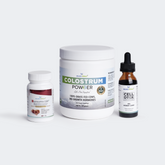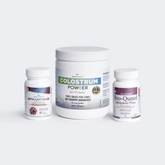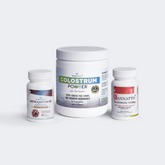What Is Brain Fog: Causes, Symptoms & Treatment
Estimated Reading Time: 7 minutes
|Ever felt like your brain’s in slow motion? You’re staring at a screen, trying to focus, but your thoughts are jumbled, your memory’s fuzzy, and even simple tasks feel tiring. That’s what many people describe as brain fog.
Let’s break down what brain fog actually is, what causes it, how it feels, and what you can do to clear it.
What Is Brain Fog, Really?
Brain fog isn’t a medical term. It’s more of a description of how people feel when their thinking is slow, fuzzy, or unclear.
People describe brain fog as:
-
“My brain feels like cotton.”
-
“Even 8 hours of sleep doesn’t make me feel mentally fresh.”
-
“I know what I want to say, but can’t find the words.”
-
“I keep forgetting small things.”
So if you’re wondering, "brain fog and memory loss—are they the same?" Not quite. Memory loss is more severe. Brain fog is temporary—and often fixable.
Fun Fact:
The term “brain fog” was first widely used by people undergoing chemo—aka “chemo brain.” Since then, it’s been adopted by just about everyone who’s felt mentally drained.
Common Brain Fog Symptoms
Here’s how brain fog usually shows up in day-to-day life:
-
Difficulty concentrating
-
Trouble remembering names or dates
-
Feeling mentally tired despite resting
-
Poor short-term memory
-
Low motivation
-
Confusion during simple tasks
-
Struggling to find the right words
-
Slow thinking or delayed response
-
Easily distracted
-
Feeling detached or spaced out
Weird But True:
Some people with brain fog feel like they're “watching themselves” go through the day, almost like a mental autopilot.
Brain Fog Causes – Why Does It Happen?
There’s no single cause. Brain fog is usually a symptom of something else—physical, mental, or lifestyle-related.
Let’s break it down into the most common causes of brain fog:
1. Lack of Sleep
Probably the biggest culprit.
-
6 hours of sleep or broken sleep messes with memory, focus, and alertness.
-
Long-term sleep issues lead to fatigue + fog = disaster combo.
Quick Tip:
If you're not waking up fresh, that’s already a red flag.
2. Nutritional Deficiencies
The brain needs fuel, and not just calories—but nutrients.
-
Vitamin B12 deficiency affects memory and thinking.
-
Vitamin D deficiency is linked to low mood and fatigue.
-
Iron deficiency leads to poor oxygen flow = slower brain activity.
-
Magnesium, omega-3, and zinc also play a role.
Do You Know?
Even mild dehydration can cause concentration problems. Your brain is 73% water, after all.
3. Stress & Anxiety
Chronic stress increases cortisol, which can interfere with memory and focus. High stress can shrink your brain’s learning and decision-making centers.
4. Hormonal Changes
Especially common in:
-
Women during pregnancy, PMS, or menopause
-
People with thyroid issues (hypothyroidism, PCOS, etc.)
Hormones influence how fast or slow your brain works.
5. Mental Overload (Digital Fatigue)
Our brains are not designed to:
-
Switch between 25 WhatsApp chats, 3 browser tabs, 4 meetings, and social media.
-
Constant notifications interrupt deep thinking.
This multitasking lifestyle causes shallow focus and mental burnout = fog.
6. Poor Gut Health
Yes, your gut and brain are connected.
-
Gut inflammation affects mood, focus, and thinking.
-
Conditions like IBS, bloating, or irregular digestion can impact your brain performance.
-
Overgrowth of bad gut bacteria = brain fog, anxiety, mood swings.
Fun Fact:
90% of serotonin (your feel-good chemical) is made in your gut.
7. Medications or Medical Conditions
Certain medications may list brain fog as a side effect, including:
-
Allergy medications
-
Sleep aids
-
Painkillers
Health conditions like:
-
Thyroid problems
-
Autoimmune diseases (like lupus or fibromyalgia)
-
PCOS
-
Diabetes
-
Long COVID
-
Depression or anxiety
Tip:
If brain fog started after a new medication, talk to your doctor. It might be a clue.
8. Post-COVID or Viral Infections
“Post-COVID brain fog” is now a recognised issue.
-
Many people complain of brain fog weeks or months after recovering from COVID.
-
Thought to be due to inflammation or changes in oxygen supply to the brain.
9. Lack of Physical Activity
Your brain needs good blood flow and oxygen to stay sharp. Sitting for long hours without movement slows everything — including your thoughts.
10. Screen Overload / Mental Burnout
Too much phone time, late-night scrolling, binge-watching — all overstimulate your brain and reduce sleep quality.
How to Get Rid of Brain Fog: The Real Fixes
Here’s what helps most people see clear improvement:
1. Fix Your Sleep First
Your brain does its best housecleaning at night.
-
Stick to a sleep schedule (even on weekends).
-
Avoid screens 1 hour before bedtime.
-
Keep the room cool and dark.
-
Avoid late caffeine or heavy meals.
-
7–9 hours of proper rest is non-negotiable.
Bonus:
Deep sleep (REM) is when memory and clarity sharpen.
2. Check for Deficiencies
Get blood tests for:
-
Vitamin B12
-
Iron (ferritin)
-
Thyroid (TSH, T3, T4)
A lot of times, just correcting these with food or supplements lifts the fog dramatically.
3. Eat for Your Brain
Add foods rich in:
-
Protein (eggs, nuts, fish)
-
Omega-3s (flaxseed, walnuts, fatty fish)
-
Antioxidants (berries, green tea, turmeric)
-
Vitamin B12 (eggs, dairy, meat, or supplements)
-
Iron (spinach, beetroot, jaggery)
-
Hydration (water, coconut water, herbal teas)
Mini Plan:
Start your day with soaked walnuts + boiled egg or sprouts. Simple brain fuel.
4. Get Moving
Physical activity increases blood flow to the brain.
Even a 20-minute walk or a 15-minute yoga session can:
-
Improve focus
-
Balance hormones
-
Reduce stress
-
Help you sleep better
5. Reduce Screen and Scroll Time
Digital detox is essential.
-
Use blue-light filters.
-
Take phone breaks every 30–40 minutes.
-
Try the 20-20-20 rule: Every 20 minutes, look at something 20 feet away for 20 seconds.
-
Try silent/notification-off hours daily.
-
Do 1–2 activities a day without screens (reading, gardening, puzzles, etc.).
6. Practice Single Tasking
Multitasking kills focus.
-
Do one task at a time, block time slots.
-
Use the Pomodoro technique (25 mins work, 5 mins break).
-
Keep your work/study space clean and quiet.
7. Deep Breathing & Mindfulness
Deep breathing slows down your nervous system.
Try:
-
4-7-8 breathing (inhale 4, hold 7, exhale 8)
-
Guided meditation apps
-
Nature sounds or just silence for 10 minutes daily
8. Track What Triggers It
Identifying patterns helps more than random guesses. Keep a small daily log:
-
Did you sleep enough?
-
What did you eat?
-
Any stress or emotional exhaustion?
-
Any new medicines?
Final Words
Brain fog is real. But it's reversible.
Most people just try to “push through it” with coffee or screen breaks, but it keeps coming back. The right way is to find the cause, fix the root, and then support your brain with daily habits.
If your mind feels foggy, slow, or disconnected—you’re not lazy, broken, or weak. You just need to hit the mental reset button.
Key Takeaways
-
Brain fog is a mental slowdown, not a disease.
-
Brain fog symptoms include forgetfulness, trouble concentrating, mental fatigue, and feeling like your brain is buffering.
-
What causes brain fog varies, but the fix often starts with your lifestyle: better sleep, smarter food choices, stress reduction, and daily movement.
-
If brain fog persists or worsens, get a medical check-up.
Disclaimer: This blog is for informational purposes only and does not provide medical advice. Always consult a healthcare professional before making changes to your diet or health routine. Individual results may vary.
References
-
Denno P, Zhao S, Husain M, Hampshire A. Defining brain fog across medical conditions. Trends in Neurosciences. Published online February 1, 2025. https://meassociation.org.uk/wp-content/uploads/2025/02/Defining-Brain-Fog-across-medical-conditions-PDF.pdf
-
Healthdirect. Brain fog. Healthdirect.gov.au. Published March 6, 2024. https://www.healthdirect.gov.au/brain-fog
-
Blackwelder A, Hoskins M, Huber L. Effect of Inadequate Sleep on Frequent Mental Distress. Preventing Chronic Disease. 2021;18(18). https://www.cdc.gov/pcd/issues/2021/20_0573.htm
-
Businaro R. Food supplements to complement brain functioning: the benefits of a combination of magnesium, folic acid, omega-3 fatty acids and vitamin E. F1000Research. 2022;11(1):140. https://f1000research.com/articles/11-140
-
Tardy AL, Pouteau E, Marquez D, Yilmaz C, Scholey A. Vitamins and minerals for energy, fatigue and cognition: A narrative review of the biochemical and clinical evidence. Nutrients. 2020;12(1):228. https://pmc.ncbi.nlm.nih.gov/articles/PMC7019700/
-
Chen TB, Chang CM, Yang CC, et al. Neuroimmunological Effect of Vitamin D on Neuropsychiatric Long COVID Syndrome: A Review. Nutrients. 2023;15(17):3802. https://www.mdpi.com/2072-6643/15/17/3802
-
Occupational Safety and Health Administration. The Cognitive Effects of Proper Hydration. https://www.osha.gov/sites/default/files/2023BeatTheHeatWinners/Contest_Innovative_KentPrecision_CognitiveEffectsHydration.pdf
-
Akram N, Faisal Z, Irfan R, et al. Exploring the serotonin‐probiotics‐gut health axis: A review of current evidence and potential mechanisms. Food Science and Nutrition. 2023;12(2). https://onlinelibrary.wiley.com/doi/full/10.1002/fsn3.3826
-
Asadi‐Pooya AA, Akbari A, Emami A, et al. Long COVID syndrome‐associated brain fog. Journal of Medical Virology. 2021;94(3). https://pmc.ncbi.nlm.nih.gov/articles/PMC8662118/
-
Datta S, Sehgal S, Bhattacharya B, Satgunam PN. The 20/20/20 rule: Practicing pattern and associations with asthenopic symptoms. Indian Journal of Ophthalmology. 2023;71(5):2071. https://pmc.ncbi.nlm.nih.gov/articles/PMC10391416/





































